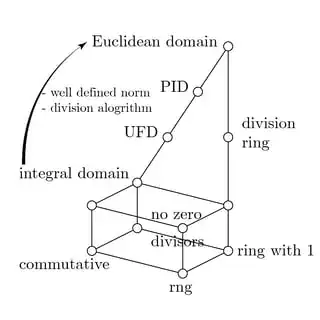It is more straight forward to give a counter example. Since $4=2 \cdot 2 = (\sqrt{8}+2)(\sqrt{8}-2)$, $\mathbb{Z}[\sqrt{8}]$ is not a unique factorisation domain (UFD), hence not a Euclidean domain. Note that those factors are irreducible.
Suppose to the contrary that $2$ is not irreducible. There exists $a,b \in \mathbb{Z}[\sqrt{8}]$ with $N(2)=4=2 \cdot 2=N(a)N(b)$. It requires that $a,b \notin U(\mathbb{Z}[\sqrt{8}])$, the set of units. Therefore $N(a)=N(b)=2$.
Let $a=u+v\sqrt{8}$ with $u,v \in \mathbb{Z}$ and $u,v$ not both zero. It follows that $N(a)=|u^2-8v^2|=2$ $\implies$ $8v^2-u^2= \pm 2$. Therefore,
\begin{equation}
(2v)^2 = \frac{u^2}{2} \pm 1
.
\end{equation}
LHS is even. If $u$ is even, RHS is odd; a contradiction. If $u$ is odd, $ \frac{u^2}{2}\notin \mathbb{Z}$; another contradiction. Therefore $2$ is irreducible.
Note that $2 \nmid \sqrt{8} \pm 2$. Hence $\mathbb{Z}[\sqrt{8}]$ is not a UFD.

Link to a bigger image:
Hasse diagram from rng to ED https://i.stack.imgur.com/jUcJX.png
